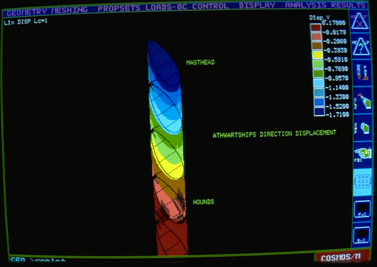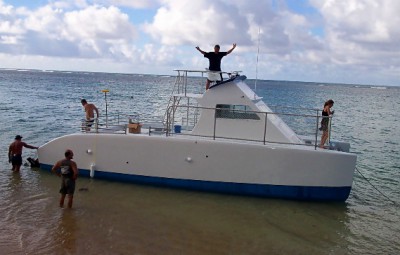I believe that government can be force for good, but USCG are really yanking my charter boat operators around. And I’m spending my week doing jobs that I should not have to bother with. I thought it would be a simple substitution of 185 lbs for 160 lbs with everything else kept the same. They are coming up with new hurdles that were never in original stability requirements. Everyone agrees that the new heavier passenger weight makes catamarans more stable. So why does trivia like not counting the number of soda cans aboard become grounds for losing your stability letter? Did they get a big funding increase there with orders to be difficult? I sound like a cranky old teapartier now.
All posts by kurt
Air-Building Boatsheds
I remember when Mark Evans worked on his Sally Lightfoot trimaran in one of these air buildings. Even on summer days it was bearable, to my surprise. It was high inside. I found these guys online http://www.websweeper.com/php/pool_domes/do-001.php
I’m impressed at the low cost.
I always wanted to do a portable house like this anyway. http://blog.modernmechanix.com/2008/05/21/your-own-inflatable-dome-make-it-from-a-kit/?Qwd=./PopularScience/7-1973/inflatable_dome&Qif=inflatable_dome_0.jpg&Qiv=thumbs&Qis=XL#qdig
I wish they were still available. I see it has plans, sort of… like I need another project.
Spam
I do try to respond to all the comments. I’ve noticed that the spam catcher gets about 350 spam a week. And it tells me that there have been over 10,000 overall. I have not been looking in the spam bin. I did once and found Orval’s note. Not sure if its real or not. If you sent a note and got no reply, hit me at khughes@multihulldesigns.com.
FEA of a Wingmast
Over the weekend I caught up with Paul Steinert, my co-presenter of a paper we did for the 1994 (that damn long ago?) MACM composites conference. The paper was a finite element study of a wingmast, designed with no shear web in it. I had a hunch that if you took the material that was the typical shear web and put it on the walls of the wing mast, you could increase strength and stiffness while decreasing weight. To acomplish shear transfer, there would be bulkheads placed at certain locations in the mast. I built and tested models, with good results, but I wanted an FEA study to confirm and Paul did it. The nested curved plate equations exploded in later versions of Word so I did not push it ahead. And some of the screen shots are gone forever. It was done for plywood, but results are just as valid for composite. I will repair the file and publish soon.

First Updated Stability Letter
I just got word of the first of the updated Stability Letters for the new passenger weight for COI cats. It took the Coast Guard 3 months turnaround time. And the CG is indeed using it as a dragnet to scoop up anyone who missed any step years ago. Some people are now learning what a deadweight survey is. Don’t wait until December.
And in San Diego area
Also, Aolani came to my attention as I’m doing the USCG update. It’s one of the 58 Sunchasers. Its certified for 49 passengers. See http://www.aolani.cc/ and they have a trick little 360 degree camera at http://www.aolani.cc/360_inside.html
Catamaran Sailing in the Ozarks
Who knew? A KHSD 48 carrying passengers in Branson, MO. See http://www.stateparkmarina.com/spirit.php
Wind Load
Here is a simple little wind load calculator that I seem to use all the time for things. http://www.sailingusa.info/cal_wind_load.htm
Northwest Yachting
Got a nice write-up in Northwest Yachting magazine. May issue. By Peter Marsh. The anchor article is about Schooner Creek Boatyard. They have built several KHSD charter cats. I had forgotten that Peter was such a unique historian to write this from his perspective. No slacker stringer could have synthesized so much history. Firsthand. And yes I do know that first picture is of Profligate. No big.
It had a link, but the link only goes to the most recent issue. And back issues lock you into a huge PDF. I bailed at 30 mg.
Hawaiian Bob Has a New Website
The old kauaifishing website no longer worked when I last looked.
Now it is http://napaliseabreezetours.com/
He offers some great fishing and sightseeing from his KHSD 34 powercat. Great mileage and a smooth ride. Yeah displacement hulls! Told me he once saw Holo Holo slicing through the waves one day when the motion was slamming the malahini silly on the other boats. Said he wanted a boat like that but smaller. It doesn’t draw much either.
